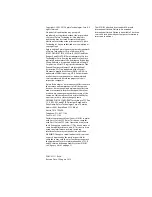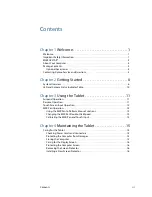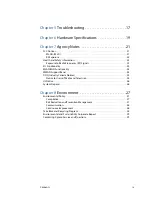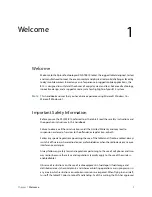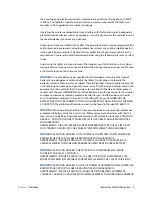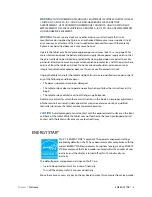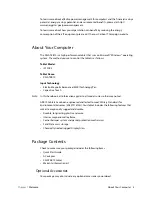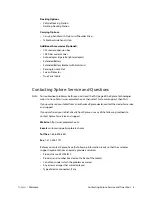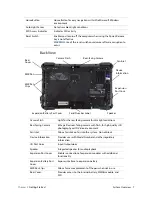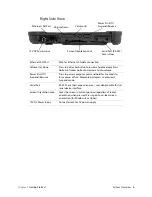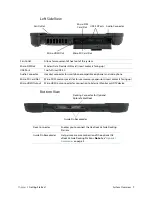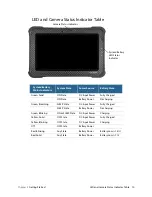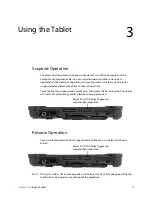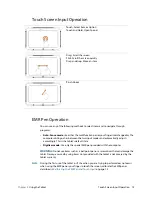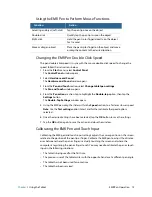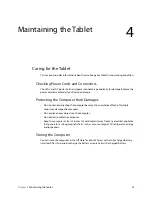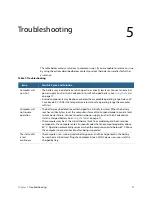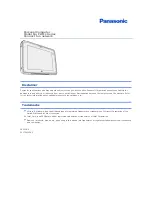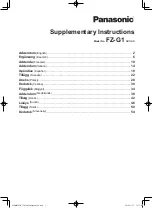
Chapter 1
Welcome
Important Safety Information 2
the use of personal electronic devices on commercial aircraft when flying above 10,000ft
(3,048m). The tablet PC should only be turned on only when directed by the flight crew
members as FAA regulations are subject to change.
Operating the wireless-enabled tablet may interfere with the functioning of inadequately
protected medical devices such as pacemakers. Consult a physician or the manufacturer of
the medical device if you have any questions.
Radio signals from your tablet will not affect the operation of most modern equipment, but
certain electronic equipment, including automotive systems, may not be shielded against
radio signals from your tablet. Check with the manufacturer of your motor vehicle or the
manufacturer’s representative to determine whether using the tablet will present any safety
issues.
Avoid using the tablet in any environment that requires your full attention, such as when
driving a vehicle. If you need to use your tablet while driving, have a passenger use it for you
or find a safe location to halt your vehicle.
WARNING:
Use only battery types specified in this handbook. Using any other type of
battery can be dangerous and can disable the tablet. Do not drop or mishandle the
batteries, immerse them in water, or subject them to high heat. Doing so could increase the
risk of explosion or leakage, and possibly cause injury. The lithium-ion batteries used in this
equipment contain material that is hazardous to your health. If battery contents come in
contact with the eyes, IMMEDIATELY flush the affected area with clean water for 15 minutes
and have someone else summon medical attention for you. Unaffected persons should
assist the affected individual in the vital first flushing of the eyes. RECHARGING THE
BATTERY MUST ONLY BE CARRIED OUT IN A NON-HAZERDOUS AREA USING THE SUPPLIED
AC ADAPTOR. The definition of hazardous areas can be found in Standard EN 60079-10.
WARNING:
When operating the tablet in a known explosive environment do not remove
or replace the battery while the circuit is live. Before removing the battery verify that the
area is known to be free of ignitable concentrations of flammable substances. EXPLOSION
HAZARD – DO NOT DISCONNECT WHILE CIRCUIT IS LIVE UNLESS AREA IS KNOWN TO BE
NON-HAZERDOUS.
AVERISSEMENT – RISQUE D’EXPLOSION. NE PAS DÉBRANCHER TANT QUE LE CIRCUIT EST
SOUS TENSION, À MOINS QU’IL NE S’AGISSE D’UN EMPLACEMENT NON DANGEREUX.
WARNING:
EXPLOSION HAZARD - DO NOT REPLACE THE BATTERY UNLESS POWER HAS
BEEN SWITCHED OFF OR THE AREA IS KNOWN TO BE NON-HAZARDOUS;
AVERTISSEMENT - RISQUE D’EXPLOSION - COUPER LE COURANT OU S’ASSURER QUE
L’EMPLACEMENT EST DESIGNE NON DANGEREUX AVANT DE REPLACER LE BATTERY.
WARNING:
EXPLOSION HAZARD - SUBSTITUTION OF COMPONENTS MAY IMPAIR
SUITABILITY FOR CLASS I, DIVISION 2;
AVERTISSEMENT - RISQUE D’EXPLOSION - LA SUBSTITUTIOND E COMPOSANTSP EUTR
ENDRE CE MATERIEL INACCEPTABLE POUR LES EMPLACEMENTS DE CLASSE I, DIVISION 2;
WARNING:
EXPLOSION HAZARD - DO NOT DISCONNECT EQUIPMENT UNLESS POWER HAS
BEEN SWITCHED OFF OR THE AREA IS KNOWN TO BE NON-HAZARDOUS.
AVERTISSEMENT - RISQUE D’EXPLOSION - AVANT DE DECONNECTER L’EQUIPEMENT,
COUPER LE COURANT OU S’ASSURER QUE L’EMPLACEMENT EST DESIGNE NON DANGEREUX.


